Course. Critical Thinking for professional development: EntreComp’s “Ideas & Opportunities”
Supporting Learners in:
• Experimenting with operative frameworks for Critical Thinking
Analysis → Inference → Evaluation
• Understanding how Critical Thinking is framed into EntreComp
IDEAS & OPPORTUNITIES’ pillar for Critical Thinking
• Having a deepen look into EntreComp
Three Training Areas: IDEAS & OPPORTUNITIES, RESOURCES, INTO ACTION
• Get more familiar with the EntreComp Framework…
…the official EU framework for education and training on sense of initiative and entrepreneurial competences
CASE STUDY
My pleasure to meet you too!
Click to open
Fresh of graduation, you just created your brand new LinkedIn account.
You chose your favorite photo, you uploaded all of your titles and certificates, you asked your friends to help you validating your competences, and you’re doing the best as you can to maximize the visibility opportunities of your profile.
Not even two days after your first sign-in, a LinkedIn notification pops-up on your smartphone: a headhunter tracks down your account and, after introducing very briefly the company he/she works for, proposes you a first informal interview for a traineeship opportunity.
This catches you completely off guard: you know nothing about this person, you know nothing about this company, you know nothing about LinkedIn headhunting’s dynamics, at the same time the opportunity to secure a traineeship offer after just few days from your graduation is too tempting…
After thanking for the message, you start processing the idea that you cannot excel in your interview as long as you’re stuck in this information asymmetry.
A saying state: “in the era of information, remaining ignorant is a choice…”, with that in mind:
- What can you do to put you at ease?
- What other relevant information, beside offer and background of the company, can help building your awareness of the context?
- How can you really impress your recruiter?
See answers
The traditional answers to these questions might seem a cliche. In the context of this training content, we wish to propose an approach a bit more “provocative”. You wish to impress your recruiter with information, questions and comments that he/she expects the least…everybody can look into the company’s website and learn few data and features about covered markets, products’ portfolio, etc., this is nothing exceptional.
Only very few people consider other strategic information…
What can you do to put you at ease?
First of all, you wish to seek for indirect information about this company. Many websites as indeed.com allows (former) employees to leave review and comments about a given organisation’s climate, leadership style, and overall corporate culture. If you start stumbling across a large set of negative reviews, this is definitely a red flag that might help you reconsidering your choice. If no alarms start ringing, you want to look into their “identity” and mimic it accordingly: mission, vision and overall tone of their communication are the pillars that set the way you should relate with this organisation and the people within.
What other relevant information, beside offer and background of the company, can help building your awareness of the context?
Your recruiter(s) know(s) enough information about you to catch you by surprise, but you know nothing about him/her/they. Most of organisation’s websites display a “Staff” or “Our Team” section. In there, you will find most likely the personnel responsible for HR and talent recruitment: these people are your targets. Don’t even try to forget their names and faces…
How can you really impress your recruiter?
In other words, how can you really give the impression to have done the extra mile? How can you make sure that the recruiter(s) will not forget about you? Remember that the recruiter represents your very first “entry barrier”, if you manage to persuade them to let you in, you have already achieved a major milestone. You need to gather as many information as you can about their background an expertise, competences and skills, passions and hobbies, weaknesses and strengths: go look at their social media profile…did they do any outdoor activity? Did they visit any interesting place? If you’re lucky enough, you have interests in common with them: this will help you in nurturing a personal connection and will prove your capabilities in dealing with uncertainty.
See more

Know your allies…
Click to open
Consider this:
You volunteer in an NGO working in the field of digital skills and IT proficiency for aspiring young entrepreneurs.
As a young professional, you’ve been tasked with the delicate activity of Stakeholder Identification: the results of your activity will inform the communication strategy that the PR office will implement for the next solar year.
Stakeholders are groups of interest, institutions, people in general that might be impacted, or might have an impact, on the activities that are planned, developed and implemented by the organization.
The head of the communication unit requests from you precise indications on the nature of the considered stakeholders (public authorities, third sector representatives, etc.), the general category their belong to and their actual relevancy for ongoing and future activities.
The aim of next year’s PR campaign is to:
- Engage the stakeholders that you identified as (potential) proactive members of your NGO’s network of associated partners
- Establish robust professional collaborations
- Develop long-term institutional partnerships
- What variables will you consider to establish a hierarchy of relevance?
- What will be the indicators of their relevancy?
- How many macro-cluster of stakeholders could you identify based on the above?
See answers
This is a typical task to which communication, marketing and PR professionals relates on daily basis. In management studies and STKH’s theory there are plenty models used to carry out these three specific activities. In the context of this training material, you will be introduced to the POWER-INTEREST Matrix (Johnson and Scholes; 1999): one of the most reliable and robust framework for stakeholder identification.
What variables will you consider to establish a hierarchy of relevance?
First, you want to set your measure units. In this case, they will be the POWER (low/high) and INTEREST (low/high) of the given stakeholder in organisation activities.
- By POWER, we refer to: the influence that the given STKH can have on organisation’ strategic decisions
- By INTEREST, we refer to: the interest that the given STKH can have on organisation’ strategic decision – and how they might be impacted by them
What will be the indicators of their relevancy?
Based on the above, there can be three layers of hierarchy (relevancy of the given category):
- High power / high interest
- High power / low interest (or vice versa)
- Low power / low interest
How many macro-cluster of stakeholders could you identify based on the above?
Depending on its relevancy, the given category should be:
- Managed very closely (High power / high interest)
- Leveraged (High interest / low power)
- Keep satisfied (High power / low interest)
- Monitored (Low power / low interest)
See more

EU Citizens’ cyber awareness: a case study to reignite your critical thinking
Click to open
You are requested to comment the following exhibit extrapolated from a recent 2020 Eurobarometer’s report, Europeans’ attitudes towards cyber security.
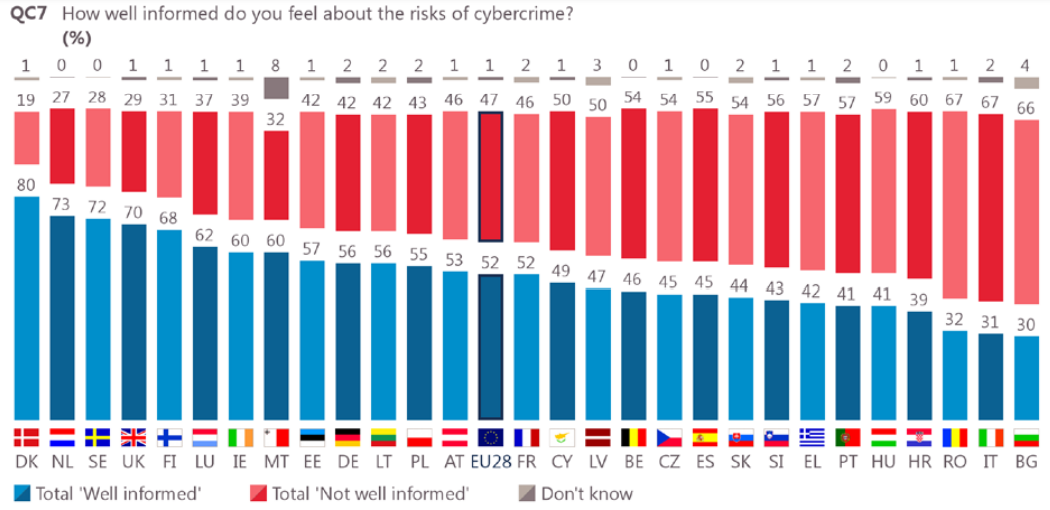
As indicated by data, there seems to be a concentration of “not well informed” citizens among Mediterranean and Balkan countries, compared to the relatively higher awareness of Northern and Scandinavian ones…how come such a distinct disparity?
With the help of this graph, we wish to stimulate your critical thinking and help you come up by yourself with possible indicators and insights that clarify the phenomenon.
- Where does this lack od cyber awareness come from?
- What might be further discriminatory variables?
- What can be done to improve laggrd's conditions?
See answers
To solve this exercise, you really need to make a couple of extra efforts so as to intercept potential skills-gap and needs-assessment that contribute in generating the phenomenon as you saw. This is a typical case in which you are requested to come up with robust conclusions on a given scenario without the possibility to rely on further exhaustive background information.
Most of times, in business environment, your decisions will move through uncertainty and you must be able to trust your guts, reasoning skills and perceptions.
The impact of the output generating from this process, will be based on the care and attention to details you’ve invested on gathering, assessing, evaluating and further processing inputs that orientate your judgment.
Where does this lack of cyber awareness come from?
First of all, cyber awareness is a direct function of digital literacy. If we cross match data from Eurobarometer with other EU reference(s), we will notice that Countries at higher cyber awareness are the same at higher digitalisation rates (direct correlation):
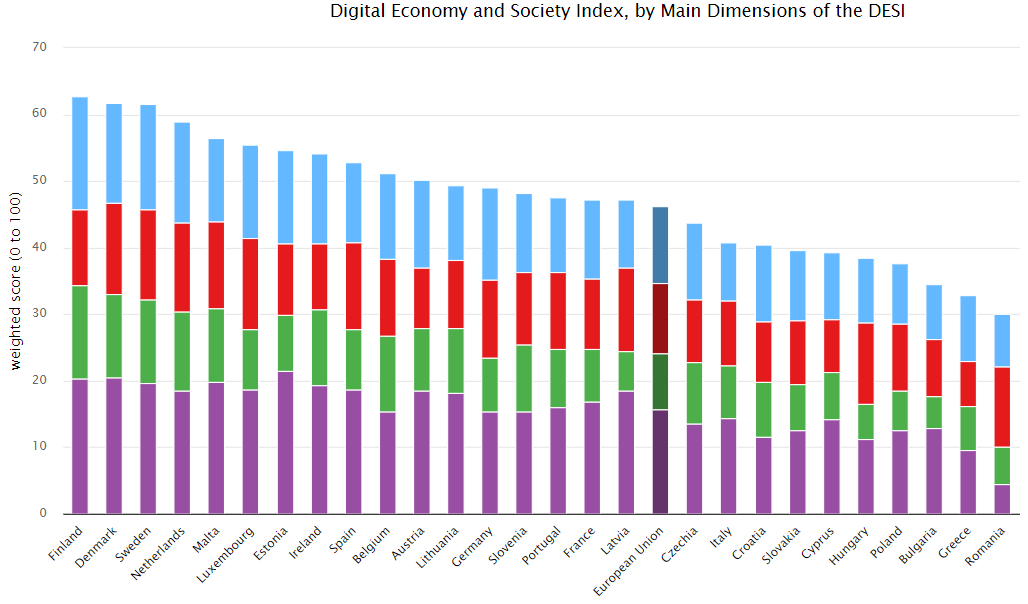
Source: DESI 2020, Digital Economy and Society Index
Blue: Human Capital; Red: Connectivity; Green: Integration of Digital Technologies; Violet: Digital Public Services
What might be further discriminatory variables?
It might be easy to assume that these differences in IT embracement are effect of the availability of infrastructures. Although this is true, it is also a very limiting perception. If we start to look into the evolution over time of each specific variable, connectivity and public digital infrastructure became more and more largely common. A stagnation effect is observed upon the Human Capital factor…symptomatic of the fact that knowledge, skills and cultures did not match up with the on-going technological development – at least, not for all countries.
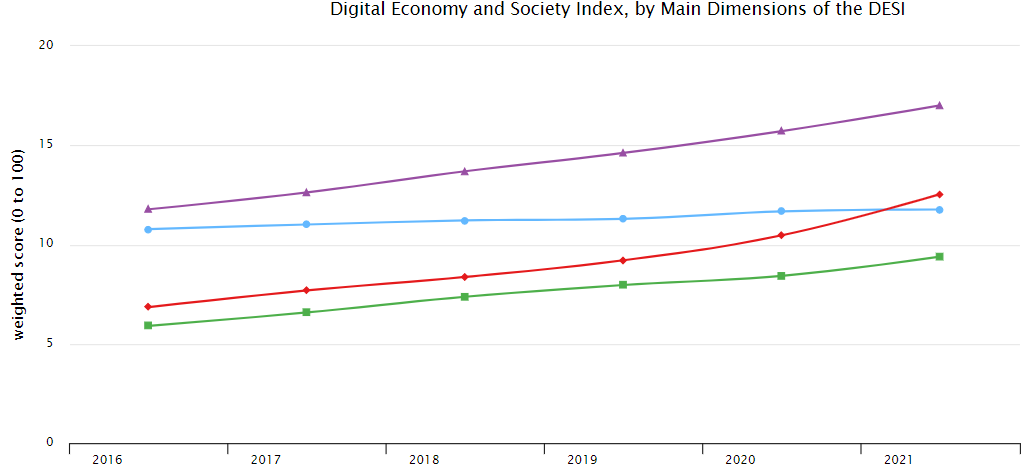
Source: idem
This is proved also by another important index aimed at investigating how EU economies, societies and organisations react – and adapt to – technological development.
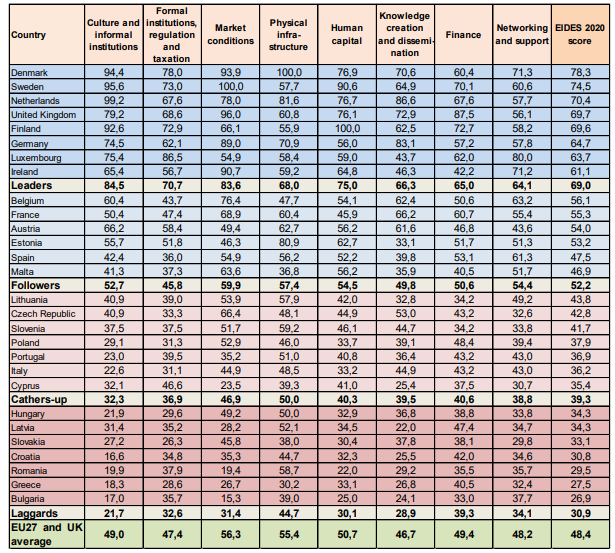
Source: EIDES 2020
Again, results from EIDES (European Index of Digital Entrepreneurship Systems) corroborates findings from DESI and provide for a very interesting lens to interpret Eurobarometer’s highlights.
It is confirmed that Human Capital and Culture represents both two fundamental pillars of digital literacy, and consequently, cyber awareness. Not surprisingly, the EU countries at lowest scores on these two dimensions are all ranking at the bottom of the Eurobarometer chart.
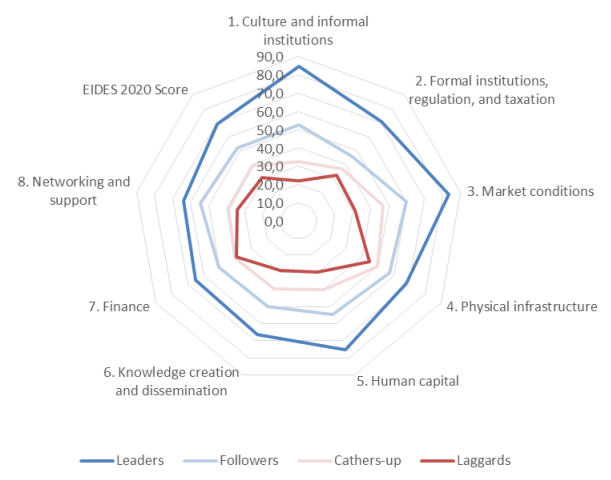
Source: Idem
There is also another important factor to consider, if we wish to wide event further the scope and scale of this analysis.
Northern countries’ national industry is typically capital and knowledge-intensive, while Mediterranean and Balkan industries are dominated by labour-intensive markets. Of course, compared to the latter, capital and knowledge intensive industries are much more IT driven; and as such, people working in this fields are subject to specific capacity building programmes – which in turn increases skills and competences of human capital.
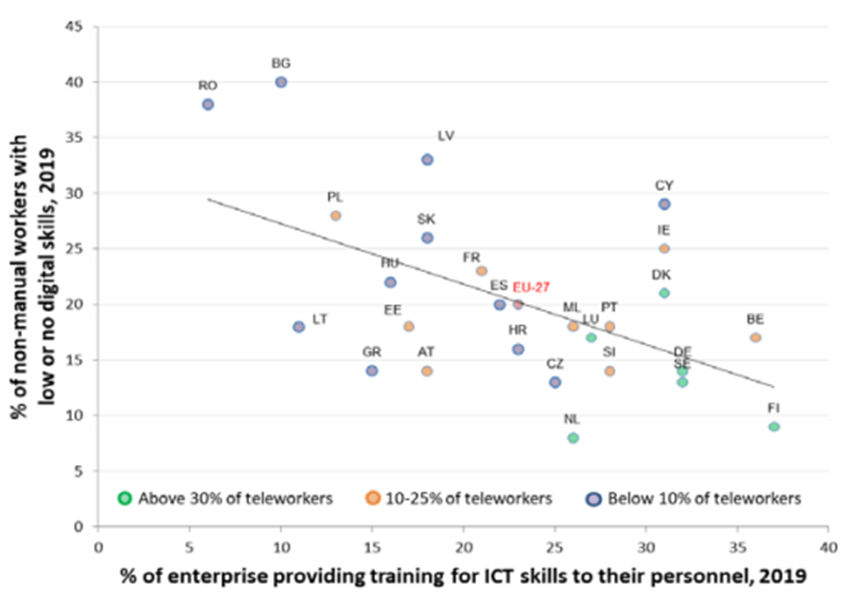
Source: Eurostat
What can be done to improve laggards’ conditions?
Preliminary conclusion → based on the above, education and training seems the key settings to work on to improve the cyber resilience of EU citizens.
See more

BEST PRACTICES
TRACK-VET
Click to open
Developing, assessing and validating transversal key competences in the formal initial and continuing VET
The main aim of the TRACK-VET project is to provide evidence based support to EU agencies, national governments and key stakeholders involved in designing and implementing policies on developing, assessing and validating transversal key competences in the formal VET system.
This will be done by:
- analysing systemic solutions, practices applied in six European countries as well as opinions of key stakeholder
- developing synthesis report containing model solutions, practices and recommendations.
TRACK-VET project defines transversal key competences (TKC) as a subgroup of the 8 key competences defined in the Council Recommendation from 2006/2018, namely: learning to learn, social and civic competences, initiative-taking and entrepreneurship, and cultural awareness and expression.
Available for stakeholders' review are descriptions of learning outcomes related to transversal key competences in VET systems (for the countries represented by the project) one of which pertains exclusively to critical thinking:
Repository of Learning Outcomes describing TKC. TRACK-VET project.xlsx
See more

eLene4Life - Learning and Interacting to Foster Employability
Click to open
eLene4Life - Learning and Interacting to Foster Employability
The main objectives of eLene4life were to:
- overcome skills mismatches with respect to soft skills;
- develop new innovative curricula and educational methods integrating active learning, addressing commonly encountered barriers such as large class sizes and physical spaces.
- improve the relevance of HE curricula in a VUCA (Volatile, Uncertain, Complex, Ambiguous) world.
eLene4Life reached over 9000 stakeholders from the HE and corporate sectors. Over 40 teachers were interviewed for the transnational analysis of active learning for soft skills development in HE, and an equivalent number of corporate stakeholders contributed to the parallel analysis.
Through this rich collection of high-quality and easy-to-use resources and the growing Community of Practice, eLene4Life has contributed to raising awareness among HE teachers of the needs and practices in the corporate sector in order to support curriculum innovation.
Similarly, corporate representatives have gained a better understanding of HE practices. Ultimately, the impact for students will be a more relevant learning experience, offering them the chance to develop contextualised transversal skills during the course of their studies and thus be better prepared for the workforce and society in general, as competent and confident 21st century citizens.
Project website and online resources: http://elene4life.eu/
See more

THINK4JOBS
Click to open
THINK4JOBS – Critical Thinking for Successful Jobs
THINK4JOBS is endorsed by a consortium of five universities and five labour market organizations from five countries.
It stems from the consolidated experience of the partnership in Critical Thinking (CT) teaching, training and research, and their commitment to empowering University-Business Cooperation (UBC) in Europe as a need to the successful employment and transition of new graduates from the university to the labour market.
To that end, it aims to develop relevant tools and unprecedented opportunities (due to their potential in terms of innovation, applicability, impact and transferability) for the effective development, support and assessment of students’ CT in the transition into a professional context using apprenticeships as a privileged interface.
The activities involved to achieve the project goals are strategically aligned in the following five outputs:
- Output 1: THINK4JOBS Toolkit with 10 CT work-based learning scenarios for each of the five different professional fields addressed by the consortium, namely Veterinary Medicine, Teacher Education, Business and Economics, and Business Informatics.
- Output 2: THINK4JOBS Training for 12 HE instructors and 12 labour market tutors. Specifically, training packages will be developed, targeting the empowerment of HEI instructors and labour market tutors in conceptual and procedural knowledge of CT as well as in the exploitation of the Toolkit in courses and apprenticeships.
- Output 3: THINK4JOBS CT blended apprenticeships curricula (12) will be developed through close collaboration of HE instructors and labour market tutors as working pairs will be developed.
- Output 4: THINK4JOBS guidelines/protocol for CT transfer from curricula to the labour market will be an output that will emerge after the implementation and evaluation of the CT apprenticeships.
- Output 5: THINK4JOBS Special issue will be a special scientific issue in a JCR/SCOPUS Journal concerning “CT: bridging a successful transition between university and labour market”.
Project website and further resources:
https://www.researchgate.net/project/Critical-Thinking-for-Successful-Jobs-Think4Jobs
See more

CATCH-21 Century Project
Click to open
21st Century Skills (Critical Thinking, Collaboration, Communication, Creativity & Innovation, Self-Direction, Making Global Connections, Making Local Connections, Using Technology as a Tool for Learning) are crucial for quality of education and training. All educators, researchers and labour market are agreed about the importance of mentioned skills but there is a lack of teaching materials and methodology.
The specific objectives are:
- create concrete and innovative teaching materials and pedagogical model concerning teaching of 21st Century Skills for HE teaching staff,
- foster cooperation between labour market and HEI organizations.
- create an online learning platform in order to help development of 21st Century Skills for HEI organizations staff and students at the EU level.
Project website and online resource: https://www.catch21st.org/
See more

CRITHINKEDU
Click to open
CRITHINKEDU – Critical Thinking Across the European Higher Education Curricula
CRITHINKEDU arises both from the background and ongoing concern of some European Higher Education Institutions (EHEI), business corporations and Non-Governmental Organisations (NGO) to better support and align the development of students’ Critical Thinking (CT) with labour market needs and societal challenges.
The project carried-out several research and training activities, leading to the development of 6 innovative outputs that can be assumed as a pioneer toolkit to the sustainability of CT education around the European Higher Education Area (EHEA).
OUTPUT 1 (O1) - A European collection of CT skills and dispositions needed in different professional fields for the 21st century.
OUTPUT 2 (O2) - A European review on CT educational practices in Higher Education Institutions
OUTPUT 3 (O3) – “The CRITHINKEDU European course on CT education for university teachers: from conception to delivery” describes the 5-day teachers’ training course, collectively designed by the partnership considering the results of O2.
OUTPUT 4 (O4) - Promoting CT in European Higher Education Institutions: towards an educational protocol.
OUTPUT 5 (O5) – Special Issue on ‘CT in Higher Education’, published in the “Studies in Higher Education” journal (Vol.44, 2019).
OUTPUT 6 (O6) - Infographic: CRITHINKEDU IMPACT REPORT – A journey on CT in European higher education. It consists in a “marketing” tool that summarizes, both quantitatively and qualitatively, the main activities and outputs achieved during the project lifetime, as well as their impact on different audiences.
Web platform: https://crithinkedu.utad.pt/en/crithinkedu/
All other online resources are available here: CRITHINKEDU
See more

TEST
5 QUESTIONS
Click to open
Keywords:
Critical Thinking, Lifelong Learning, EntreComp, Ideas & Opportunities, Soft Skills, IPO Model, Analysis, Inference, Evaluation
Learning outcomes:
- The EntreComp Framework to nurture your entrepreneurial attitudes
- Critical Thinking in EntreComp: IDEAS & OPPORTUNITIES’ pillar
- Critical Thinking from “soft” to “employability” skills
- Analysis → Inference → Evaluation
- IPO: Input → Process → Output
Bibliography:
n/a

 Play Audio
Play Audio 


